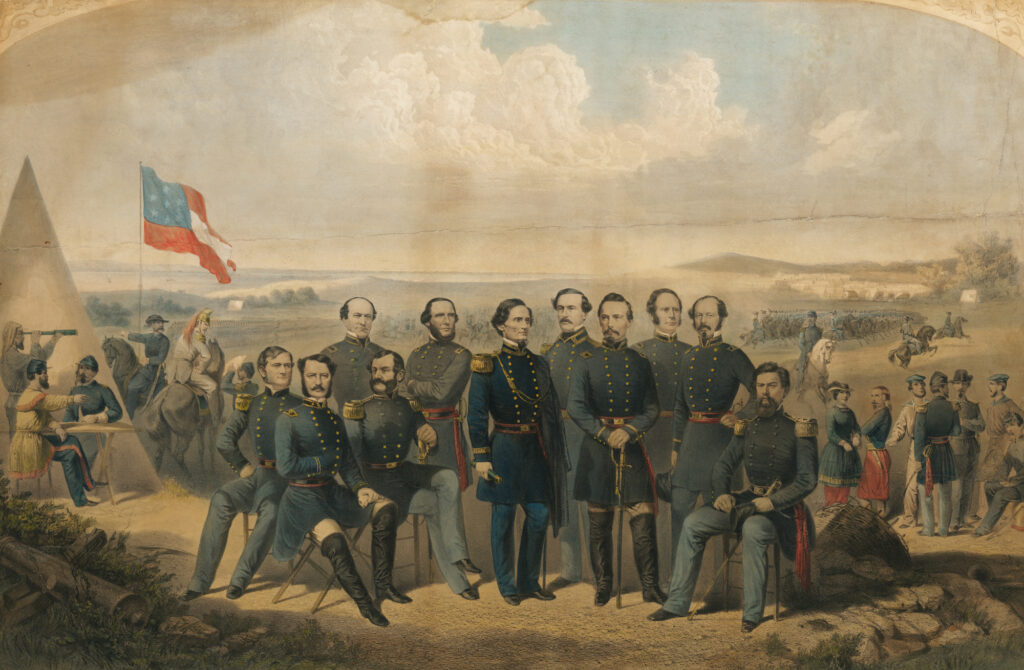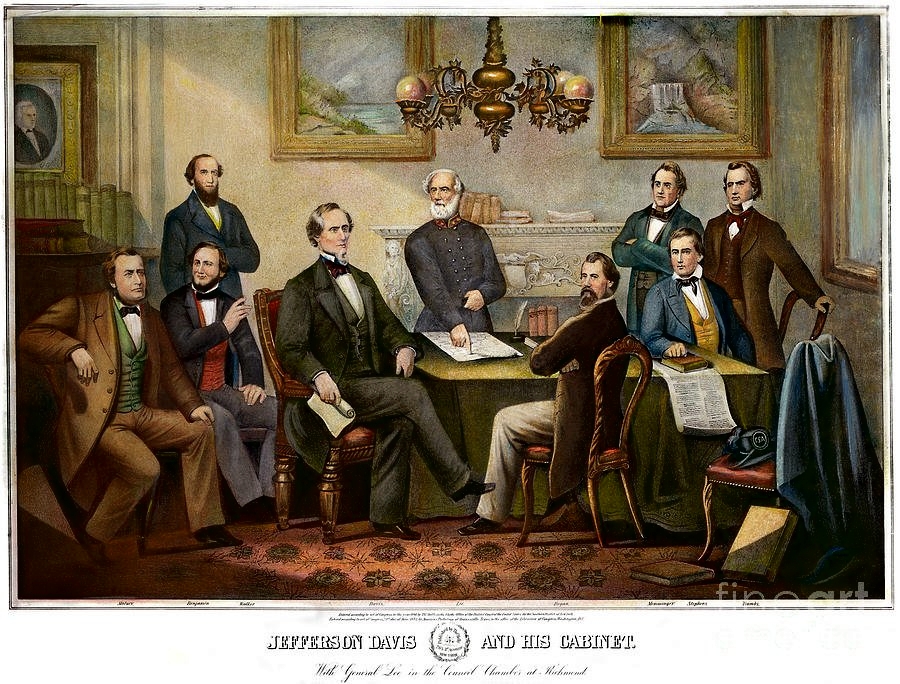Commander-in-Chief at Civil War: Jefferson Davis
ECW welcomes back guest author Kyle R. Hallowell
Continuing my previous post, I will evaluate and analyze Jefferson Davis’s role as commander-in-chief of the Confederacy and describe how his actions and inactions ultimately led to his nation’s defeat.
Unlike Lincoln, Jefferson Davis failed the crucial test of determining the kind of war his nation was embarking on. He consistently failed to synchronize military, political, economic, and diplomatic policies, and never considered the fundamental question of what the Confederacy would have to do to win the war.[i] The Confederacy’s primary war aim was to become a sovereign nation with a slave-based economic and social order.[ii] Davis and other Confederate leaders believed this could be obtained by denying the Union military victories, protecting southern territory, and gaining diplomatic recognition and military intervention from Britain or France. However, Davis never implemented or enforced a national strategy to achieve these aims and enacted harmful policies that compounded the Confederacy’s difficulties.

Davis occasionally discussed strategic issues and policy with his cabinet, governors, and generals. Yet, constant personnel changes and Davis’s mercurial temperament precluded developing and implementing an enduring national strategy.[iii] However, it can be argued that in the war’s first year, Davis, at the behest of state governors, implemented a strategy of defending all Confederate territory, regardless of value. This attenuated the Confederacy’s scarce manpower across a wide area, leaving it vulnerable to attack. The Union’s capture of forts Henry and Donelson, Roanoke Island, and New Orleans in the spring of 1862 cleaved valuable territory that could have been better defended had more men been available from elsewhere and had national and state authorities cooperated. Later, Davis uncharacteristically admitted that his decision to create too many garrisons was a mistake.[iv]
Both sides had varying resources, advantages, and disadvantages. Lincoln’s government started the war with a standing army and navy, an established diplomatic corps, international recognition, a developed industrial base, and a solvent currency backed by gold. The Confederacy had none of these. However, the Confederacy was not hampered by precedent and could design a government in the way it best saw fit to attain its independence. Davis had a free hand to define his military role. Unfortunately for the Confederacy, Davis defined his role as general-in-chief and commander-in-chief, preventing him from performing either role effectively.
Due to his military education and training, Davis took a more expansive role in his military authority by acting as his own general-in-chief. He believed that the Confederate constitution made him the sole source of military authority and that he could personally command the army in an emergency.[v] Robert G.H. Kean, who worked in the Confederate War Department, said, “Davis wasted time on trash that ought to be dispatched by clerks.”[vi] Davis could not restrain himself from exercising his military authority. On the evening of July 21, 1861, after the fighting at First Bull Run had concluded, Davis arrived on the field and personally attempted to rally stragglers and lead them back to the battlefield.[vii] In 1862, Davis vetoed a bill creating a general-in-chief position and later pocket-vetoed a bill creating an army general staff, believing these positions would reduce his power.[viii] These actions highlight one of Davis’s fundamental failings, his inability to utilize talented subordinates for fear of being overshadowed. Had Robert E. Lee been promoted to general-in-chief in 1862 as was intended, the Union would likely have had a much harder time subduing the Confederacy.

Davis also had difficulty admitting that he was wrong, especially regarding military matters. During the war, Davis bitterly feuded with Joseph Johnston and P.G.T Beauregard, which manifested in neither man’s talents being utilized fully. Compare this with Lincoln’s letter to Grant admitting that the latter was correct and the former wrong about Vicksburg or Lincoln’s measured and paternal letter to Joseph Hooker asking him for military success after Hooker criticized him publicly.[ix] Davis’s attention to detail and refusal to delegate meant he squandered his valuable time and unduly constrained his field commanders.
Davis’s personality was a significant reason the Confederacy failed to develop a national strategy. Davis was imminently qualified to be a wartime president, having been educated at West Point, served as secretary of war, and led troops in the Mexican-American War. However, Davis had a sensitive ego and greatly valued loyalty from subordinates, causing him to retain those he liked even after they demonstrated incompetence, such as Braxton Bragg. After Bragg was removed from the command of the Army of Tennessee, Davis gave him a de facto promotion by appointing him as his military adviser. This sharply contrasts with Lincoln, who repeatedly fired generals and did not reward incompetence with promotion.
Lincoln prioritized victory above all else and was willing to tolerate subordinates that he did not like if they could win battles. Davis was the opposite and frequently quarreled with those who disagreed with him regardless of ability, such as Joseph Johnston, with whom he had a toxic relationship. Davis’s vanity and dislike of Joseph Johnston clouded his judgment and affected his decision-making. During the Atlanta Campaign, Davis refused to order Maj. Gen. Stephen Lee to send a cavalry force to cut the rail line supplying Sherman’s army group, despite Johnston’s request to do so.[x] Later, when he sought to replace Johnston, Davis allowed himself to be wooed by John B. Hood, whom he then appointed as commander of the Army of Tennessee, even after Robert E. Lee endorsed William J. Hardee for the command.[xi]
Davis also ignored his adviser’s warning about his decision to implement an embargo on exporting cotton. Many Confederate leaders assumed that Britain, with its need for cotton to fuel its textile industry, would intervene on behalf of the Confederacy. At the outset of the war, Davis decided that the Confederacy would conduct a self-imposed cotton embargo to coerce Britain into the war. However, the 1860 bumper crop and the Emancipation Proclamation rendered the Confederacy’s self-imposed embargo ineffective and made intervention moot. Even after the possibility of British intervention had waned, Davis refused to admit his folly. He stubbornly clung to the embargo, even after Robert E. Lee and Judah P. Benjamin advised him to permit cotton exportation.[xii] The only leverage the Confederacy had with the British and French governments was cotton. Davis’s embargo removed that leverage. In this way, Davis betrayed a certain tone-deafness regarding foreign policy and diplomacy.[xiii]

Davis’s failure to use all his instruments of national power stems from mismanaging his cabinet. During four years of war, Davis had five secretaries of war, four secretaries of state, six attorneys general, and three treasury secretaries.[xiv] The only members of Davis’s cabinet to remain in office throughout the war were Secretary of the Navy Stephen Mallory and Postmaster General John Reagan. In contrast, Lincoln had two secretaries of war and one secretary of the Navy. Lincoln relied heavily on his second secretary of war, Edwin Stanton, to whom he gave much latitude to perform his duties. In contrast, Davis micro-managed his secretaries of war, feeling that he could perform the role better, and delegated little authority to them. It is telling that Stephen Mallory remained in his position for four years when his colleagues in other cabinet posts, specifically the war office, were constantly turning over. Davis’s background as a soldier and former secretary of war produced a lack of knowledge about naval affairs; thus, Davis did not feel the need to micromanage Mallory.[xv] However, this disinterest produced the disastrous effect of Davis doing little to coordinate the war and navy departments. The lack of Confederate joint operations in the war supports this. On the other hand, Lincoln ensured that his war and navy departments coordinated, allowing the Union to conduct successful joint operations, such as Vicksburg and Fort Fisher.[xvi]
All these valid criticisms aside, Davis deserves credit for undertaking the monumental task of trying to lead a fledgling nation with limited resources to victory in a grueling, modern war. Davis endured many painful ailments during his presidency, such as malaria, near-total blindness in his left eye, and recurring digestive ailments.[xvii] In a way, Davis was doomed to fail. Davis tried vainly to wage a national war effort and was foiled by the advocates of states’ rights at nearly every turn. Convincing the people of the individual states to sacrifice for the national effort was highly difficult, and Davis lacked the charisma and popular mandate to be a unifying figure. The war’s result speaks for itself: Abraham Lincoln led his nation to victory, and Jefferson Davis led his to defeat.
Kyle R. Hallowell is an active-duty U.S. Army Strategist currently studying International Policy at Texas A&M University. He has a BA in History from Norwich University and has been passionate about the Civil War since childhood. He lives in Northern Virginia with his wife and son.
Endnotes:
[i] David M. Potter, “Jefferson Davis and the Political Factors in Confederate Defeat,” ed. David Herbert Donald, Why the North Won the Civil War (Pickle Partners Publishing, 2014). 93.
[ii] Alexander H. Stephens, “Corner Stone Speech,” (March 21, 1861). https://teachingamericanhistory.org/document/the-corner-stone-speech/.
[iii] Robert G. Tanner, Retreat to Victory?: Confederate Strategy Reconsidered, (Scholarly Resources, 2001), 2; Frank E. Vandiver, Rebel Brass: The Confederate Command System (Baton Rogue: Louisiana State University Press, 1956), 7.
[iv] Tanner, Retreat to Victory, 1,16.
[v] Stoker, The Grand Design, 22.
[vi] Potter, “Jefferson Davis and the Political Factors in Confederate Defeat,” 90.
[vii] Ethan S. Rafuse, A Single Grand Victory: the First Campaign and Battle of Manassas (Wilmington, Delaware: Scholarly Resources Inc., 2002), 201.
[viii] “A Veto by Jefferson Davis,” The North American Review 142, no. 352 (1886): 457-65, http://www.jstor.org/stable/25118593.
[ix] “Letter to General Ulysses S. Grant, July 13, 1863,” 1863, accessed July 9, 2024, https://www.abrahamlincolnonline.org/lincoln/speeches/grant.htm; “Letter to Major General Joseph Hooker,” 1863, accessed July 9, 2024, https://www.abrahamlincolnonline.org/lincoln/speeches/hooker.htm.
[x] Albert Castel, Decision in the West: The Atlanta Campaign of 1864 (University Press of Kansas, 1992), 302-3.
[xi] Ibid, 353.
[xii] Potter, “Jefferson Davis and the Political Factors in Confederate Defeat,” 84.
[xiii] Don H. Doyle, The Cause of All Nations: An International History of the American Civil War (Basic Books, 2017), 39.
[xiv] Dennis L. Peterson, Confederate Cabinet Departments and Secretaries (McFarland, Incorporated, Publishers, 2016), 19.
[xv] Vandiver, Rebel Brass, 66-7.
[xvi] T. Harry Williams, Lincoln and His Generals, First Vintage Civil War Library Edition (New York: Vintage Books, 1952, 98, 190.
[xvii] Peterson, Confederate Cabinet Departments and Secretaries.
This quote struck me
“Davis wasted time on trash that ought to be dispatched by clerks.” Robert E Lee was known to make the same mistake
Napoleon Bonaparte thought the cordon defense strategy mainly useful for stopping smugglers.
Yes, the whole failure runs through Davis. He never got a grip on the Trans-Mississippi either and made a horrendous choice in assigning Theophilus Holmes to command.
thanks for these companion pieces on Davis and Lincoln … they highlight the spectacular difference between their performance as commander in chief … Lincoln picked the right leaders — Stanton Grant, Halleck, Meade, Sherman, Sheridan and Thomas — and created the winning combination of political, strategic, operational and tactical execution … Davis did not.
What did Jeff Davis do right? He organized a Government in months. He fought a war for four years. Clearly Davis and his Cabinet did something right?
On the matters you mention I completely agree … Davis, however, never got the main thing right — turning military operations into a positive political outcome — that’s the commander-in-chief’s main thing.
The fact that he lost…well…
Well done, informative overview with just enough detail to make this commentary very helpful.